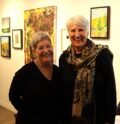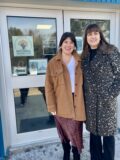Headline News
CSWB community consultation surveys completed
March 3, 2021
March 3, 2021
By Mike Riley
Local Journalism Initiative Reporter
South Algonquin Township just completed the public consultation survey phase for its Community Safety and Well Being Plan, which is due to be submitted to the provincial government by July 1. Coordinated by Dr. Meara Sullivan, the survey found that employment, COVID-19, healthcare and affordable housing were residents’ biggest concerns. On the plus side, 95 per cent of respondents felt safe within their respective communities.
In a media release from Dr. Sullivan on Feb. 23, the results of the community consultation survey in South Algonquin were made public. The municipal councils of the townships of Brudenell, Lyndoch and Raglan, Killaloe, Hagarty and Richards, Madawaska Valley and South Algonquin decided to work collaboratively with Dr. Sullivan to come up with a CSWB plan, and Dr. Sullivan also administered surveys to those municipalities for their input. The survey ran from Oct. 5 to Nov. 30, 2020. Available in hardcopy and online through Survey Monkey, 305 local residents from all the townships participated. Eighty-one people participated from South Algonquin, or 7.4 per cent of its population of 1,096.
Dr. Sullivan is a community and restorative justice specialist with over 20 years experience in her field. Her experience led her to be hired by the seven municipalities of North Hastings in 2019 to help them to come up with their own CSWB programs.
This tenure helping the municipalities in North Hastings led her to be hired by South Algonquin, Brudenell, Lyndoch and Raglan, Killaloe, Hagarty and Richards, and Madawaska Valley, as well as her teaching experience in Community, Safety and Well-Being at Loyalist College.
Within South Algonquin, survey respondents had an average age of 55 to 64 years, 75 per cent were female, 92 per cent were white/Caucasian, 75 per cent had a post secondary education, 68 per cent were permanent residents, 90 per cent lived in a home they owned, and 9 per cent said they experienced home insecurity or homelessness in the past year.
The good news was that 95 per cent of respondents always or often felt safe in their community, while a strong sense of community and sense of belonging was felt by 57 per cent. While employment at 33 per cent, COVID-19 at 27 per cent, affordable housing at 23 per cent, and healthcare access at 18 per cent were listed as the greatest concerns and the services needed in the area, the greatest community strengths were hailed as nature at 73 per cent, peace/quiet at 60 per cent, small town/rural life at 56 per cent and peace/quiet.
It wasn’t a surprise that 75 per cent of respondents reported that COVID-19 had brought higher levels of stress, and 47 per cent reported that the ongoing pandemic had greatly impacted their work and family life.
Dr. Sullivan completed the data analysis and the final report, and says that the results give significant insights into the views of the 305 local area residents.
“The sample is comprised of individuals who volunteered to participate and is not intended to represent the overall population. However, every resident has a unique voice and each is equally important,” she says.
Now in its final phase, the CSWB planning information will be compiled into a regional plan. The final plan will be sent to the Solicitor General and shared with the community by July 1.
Dr. Sullivan says that their information gathering process has finished, which included a local service providers’ survey, the community consultation survey, meetings with local agencies and advisors, attendance at round tables on physical and mental health, collecting statistical and previous reports data, and one on one discussions with community members.
“In order to be responsive to the immediate needs of the COVID-19 pandemic, we have to be flexible in our planning. At this point, in order to meet the deadline, set by the province, I am compiling all the available information into the final plan,” she says. “I will be reaching out to our advisors throughout this process to ensure the final plan meets the needs of the individuals that are at the greatest risk.”

















